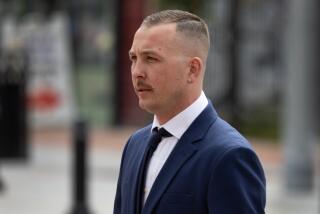South Carolina church shooter Dylann Roof poised to represent himself at sentencing hearing Wednesday
The white supremacist found guilty last month of gunning down nine black members of a South Carolina Bible study class plans to represent himself Wednesday in court proceedings to determine whether he will receive the death penalty.
In an unusual move, 22-year-old high school dropout Dylann Roof has chosen to dismiss his experienced capital defense attorney.
If the 12-member jury votes unanimously in favor of the death penalty, Roof could become the first person in American history sentenced to death in a federal hate-crimes trial. He faces death by lethal injection or life in prison.
On Dec. 15, a federal jury in Charleston found Roof guilty of 33 counts in the June 2015 massacre at Emanuel African Methodist Episcopal Church in Charleston, including committing a hate crime against black victims, obstructing the exercise of religion and using a firearm to commit murder. The Department of Justice is seeking the death penalty on the basis of Roof’s significant premeditation, apparent lack of remorse and stated animosity toward African Americans.
On Monday, Judge Richard Gergel ruled Roof competent to represent himself during sentencing. The decision, announced after a daylong hearing that was closed to the public, represented yet another blow for Roof’s court-appointed attorneys, who have failed to convince their client that his best chance of avoiding execution is a mental health defense.
When sentencing starts Wednesday, federal attorneys will begin to call more than 30 witnesses in an attempt to persuade jurors that Roof should be sentenced to death. Roof, meanwhile, plans on calling no witnesses and presenting no evidence.
“I expect it to be a charade of a capital sentencing,” said Christopher Adams, a Charleston defense attorney who specializes in federal cases and is not involved in this one. “Here you have a guy who clearly is mentally ill, and he is not going to present any mental health evidence. So the jurors are going to be asked to make the toughest decision imaginable under law without any real information.”
During the trial, jurors watched Roof confess in a taped interview with FBI investigators, heard from two survivors who identified him as the shooter and saw closed-circuit television footage of him exiting the scene of the crime with a gun in his hand. Even his attorney admitted Roof committed the massacre.
“If anybody ever has been a candidate for the death penalty, Dylann Roof would be a candidate,” said Joseph Darby, a presiding elder of the Beaufort District of the A.M.E. Church and the first vice president of the Charleston branch of the National Assn. for the Advancement of Colored People. “If he is not executed, it would be hard to make the case for anyone else to be executed in America.”
Family members who testify during the sentencing phase of the trial are not allowed to tell the jury what penalty they would like Roof to receive.
Two days after the massacre, some relatives of those who died expressed forgiveness at Roof’s bond hearing, calling for God to have mercy on him. President Obama and Republican Gov. Nikki Haley praised what they called family members’ “grace.”
From the beginning, Roof has balked against the idea of being defended on the basis of any mentally illness.
“I am morally opposed to psychology,” he scrawled in a journal that investigators found in his car after the massacre. “It is a Jewish invention, and does nothing but invent diseases and tell people they have problems when they don’t.”
“I will not be calling mental health experts or presenting mental health evidence,” he wrote to Judge Gergel a day after a jury found him guilty.
If Roof is sentenced to death, the dispute about his choice to represent himself and his withholding of information about his mental health will probably lead to multiple appeals, legal experts said.
Before the trial began, a rift emerged between Roof and his lawyers over the question of his mental health. Roof’s attorneys raised questions about his mental state, asking the judge to declare their client incompetent to stand trial. Capital defendants often choose to represent themselves “in order to prevent presentation of mitigating evidence at the penalty phase of their trials that they cannot bear to have revealed,” they noted in a court motion.
After ordering a psychiatric competency assessment of Roof, Gergel found him capable of standing trial, stating he had an “extremely high IQ” and was able to understand legal proceedings.
But some legal experts pointed to a difference between mental ability and judgment.
“You can have an understanding of the legal process, but that does not mean you are any less mentally ill or emotionally disturbed,” said Robert Dunham, executive director of the Death Penalty Information Center. “To the extent that your extreme mental illness or emotional disturbance affects your perception of the evidence, and affects your perceptions of issues like motive, you may be incapable of making rational trial decisions.”
During the guilt portion of the trial, Roof’s attorney, David Bruck, tried repeatedly to raise the issue of mental illness, drawing attention to his client’s “abnormal” and “delusional” behavior: his seeming inability, a day after the crime, to judge how many people he had killed; his unwillingness to make small talk with investigators; his admission to FBI agents that he didn’t have a best friend.
Roof, he emphasized, was a loner who took hundreds of photos of his cat, and appeared to have no close connection with any human being.
After the jury found Roof guilty and he reiterated his decision to represent himself in the sentencing phase, his attorneys asked the judge for a second hearing, again raising the question of Roof’s competence. A court-appointed forensic psychiatrist examined Roof last weekend. After interviewing the psychiatrist and a number of other witnesses, Gergel again ruled that Roof was competent to represent himself.
While Roof has said he will not introduce witnesses, he is likely to deliver opening and closing statements during his sentencing phase. Gergel issued firm ground rules Monday, specifying that Roof must sit at the third seat from the center aisle, address jurors from a lectern facing the jury box, and not “attempt to approach the jury, the witness stand, or the bench.”
Even if Roof, who faces a separate death penalty trial in state court later this month, is sentenced to death, he is unlikely to be executed anytime soon — partly because death penalty cases involve years of appeals, but also because South Carolina is one of many states that faces challenges in acquiring drugs for lethal injection.
Jarvie is a special correspondent.
ALSO:
Thousands of California soldiers forced to repay enlistment bonuses a decade after going to war
Defense secretary orders Pentagon to stop seeking repayment of California National Guard bonuses
Congress proposals would let California National Guard soldiers keep millions in bonuses
More to Read
Start your day right
Sign up for Essential California for news, features and recommendations from the L.A. Times and beyond in your inbox six days a week.
You may occasionally receive promotional content from the Los Angeles Times.







